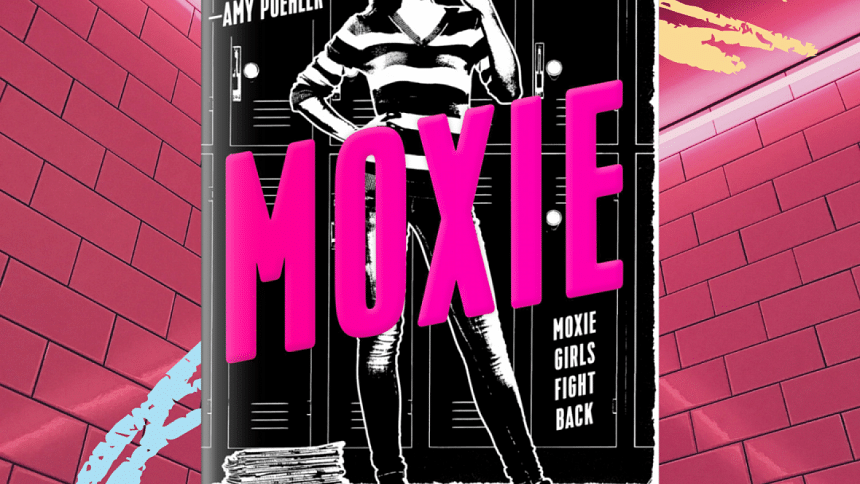Moxie: A whitewashed account of second-wave feminism

I've lost count of the number of people who have recommended Jennifer Mathieu's best-selling book Moxie (Roaring Brook Press, 2017) to me. All I ever saw about the book were torrents of positive reviews on social media, one following another.
I was caught in the waves of this excitement, and my expectations for the book were sky-high. Moxie soon rose up the ranks until it topped my personal 'to-be-read' list for over a year. It was when I got wind of a then-upcoming Netflix adaptation that I couldn't waste any more time, and I went and bought myself a paperback copy.
Set in a fictional Texan town called East Rockport, Moxie revolves around Vivian, a "nice girl" set against the hellscape of a sexist high school, who finds inspiration in her mother's teenage past to kick start a feminist revolution of her own. A promising premise indeed, setting up a wholesome "girls-supporting-girls" atmosphere in which young ladies band together to give one back to the misogynists they're forced to tolerate every day at school. While it was the premise that caught my attention, it was a classroom incident in the first chapter that kept me reading. I enjoyed the refreshingly realistic portrayal of an American high school without the usual cliques; I enjoyed the '90s 'Riot grrrl'-inspired aesthetics, and the quirky writing style which was strongly reminiscent of Meg Cabot's in The Princess Diaries (HarperCollins Publishers, 2000).
However, by the time I'd reached the end of the book, my enthusiasm had completely dissipated. To say I was disappointed might be a little harsh. A word more fitting for my reaction would be "unimpressed".
Here is where the YA bestseller has gone wrong. Jennifer Mathieu's story, I'd say, fails to live up to its promise of a feminist upending of traditional YA literature. Instead of giving us an insight into present day fourth-wave feminism which incorporates intersectionality into the feminist movement, Mathieu stuck to the basics of second-wave feminism. This is worsened by Mathieu's constantly apologetic tone and the surface-level exploration of feminism through the 'Riot grrrl' zines. Readers never gets to see Vivian's mother acting as the fierce feminist she was once supposed to be, but we do get our fair share of her encouraging unhealthy compromises with defeatist statements like, "Sometimes a moderate Republican is the best we're going to get".
Vivian's growth from a high school teen harbouring internalised misogyny to a more well-informed feminist doesn't hold a great deal of substance either. Mathieu speeds through the entire journey instead of giving it the time needed to develop—robbing readers of the chance to witness the struggles involved in breaking out of a conservative community.
Mathieu's writing doesn't take itself too seriously, which wouldn't have been much of a problem had the focus of her book not been about one of the most pressing social issues today. Because the story is presented entirely through Viv's perspective, the reader misses out on exploring the lives of other characters, because the protagonist herself doesn't seem interested in being particularly observant in that regard. While the interactions between Viv and her loved ones are grounded in a sense of wholesomeness, they serve primarily as plot devices one can just flip through. And the tonal shifts between slapstick comedy and intense drama in the writing don't just make the narrative uneven; they also deprive it of necessary emotional depth.
I thought the plot of Moxie could only be improved upon; but then in early March I watched its Netflix adaptation directed by Amy Poehler, which was a massive letdown in the name of a bildungsroman.
Screenwriters Tamara Chestna and Dylan Meyer bungled the source material by giving us a watered-down protagonist, who decides to revolt against patriarchy just so she would have something to write about in her college application essay. Most offensive among the screenplay's additions is the "white savior" trope carelessly inserted into a story that was previously race-neutral—the film adds characters of colour and a white character with disability, but instead of allowing these characters to speak or act on their behalf, the narrative is told primarily through the all-too-common perspective of a privileged white American.
Will I read the book again? I just might.
Will I watch the film again? Thank you, next.
Rasha Jameel studies microbiology whilst pursuing her passion for writing. Reach her at [email protected]

 For all latest news, follow The Daily Star's Google News channel.
For all latest news, follow The Daily Star's Google News channel. 



Comments